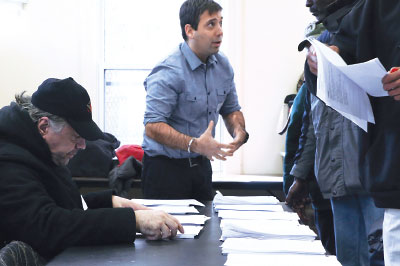AACP Offers Certification Exam in Community Psychiatry
Abstract
Taking the exam, offered through APA’s Learning Center on the APA website, should enhance the value a psychiatrist brings to any practice setting and may lead to increased salary and promotion.
Community psychiatrists can now be certified for their expertise in working in public systems serving underserved populations through an exam offered by the American Association of Community Psychiatrists (AACP).

Tony Carino, M.D., counsels individuals during a mental health outreach event at a soup kitchen in New York City.
The certification exam is offered through APA’s Learning Center on the APA website and costs $250 for AACP members and $400 for nonmembers.
“For psychiatrists who wish to distinguish themselves as having developed a broad knowledge of community psychiatry, the AACP training and certification present a great opportunity to highlight a psychiatrist’s knowledge and skills,” said APA Director of Education Tristan Gorrindo, M.D. “This program is an important addition to the diverse trainings offered through the APA Learning Center.”
Tony Carino, M.D., an assistant clinical professor of psychiatry at Columbia University and director of psychiatry at Janian Medical Care in New York City, has been a leader in helping to develop the certification exam. In an interview with Psychiatric News, he explained there are three pathways to eligibility for the exam, what he called the “three Es”:
Education: Psychiatrists must have completed training in one of the approximately two dozen community fellowship training programs in the United States.
Experience: Psychiatrists must have worked at least 20 hours a week for five years in a public or community setting after completing psychiatry residency training.
Early career experience: Psychiatrists must have worked full time (at least 35 hours a week) for two years in public or community settings after completing psychiatry residency training.
Psychiatrists interested in taking the exam should contact AACP Administrative Director Frances Bell and complete a form testifying that they are eligible through one of the three pathways. Candidates will then be given an access code to take the exam on the APA Learning Center.
AACP President Michael Flaum, M.D., said that certification can enhance the value a psychiatrist brings to any system where he or she is employed and may reap benefits in salary and promotion.
“We believe there is a real set of skills and areas of expertise not traditionally covered in many psychiatry residency programs,” he told Psychiatric News. “The world of public and community psychiatry has matured over the last decade as evidenced by the proliferation of community psychiatry fellowship programs. There are thousands of APA members who are working in these community settings—including in jails and prisons, addiction treatment facilities, homeless outreach centers, and state institutions. We think they should be recognized and ideally compensated for their distinct knowledge and skills, and we hope that this type of certification will facilitate that.”
Carino told Psychiatric News that the idea behind certification had its genesis in 2009 when he was completing community fellowship training at Columbia.
“As I was going through my training, I heard a lot of people talk about community psychiatry as a job or a role that people fell into by chance,” he said. “But what I realized is that there are lots of extraordinary psychiatrists working in public settings who didn’t fall into it by chance but actively chose it and who want to work with underserved populations in public and community settings.
“I felt strongly that this is a career path that psychiatrists should be proud of and that there are a knowledge base and skill set that is specific to what we do,” he continued. “A lot of other fellows I talked to were wondering why there was no formal certification for community psychiatry.”
In 2010, Carino and members of the AACP board and other leaders in community psychiatry began a process to validate the subject areas of community psychiatry, soliciting input from AACP members through a listserve and consulting with directors of community fellowship programs. Carino cited Jules Ranz, M.D., of Columbia; Wes Sowers, M.D., of the University of Pittsburgh; and the now-deceased Richard Christiansen, M.D., of the University of Florida College of Medicine, as crucial leaders in the effort.
The group was able to identify a set of domains of knowledge specific to community psychiatry and began the process of writing an exam, using the guidelines for question writing employed for other board-certifying exams. In 2013, they pilot tested an exam with a group of experts with long experience in community psychiatry, a group of early career psychiatrists practicing in public settings, and a group of PGY-4 residents.
The pilot test validated the exam—all of the experts passed the exam, while 67 percent of ECPs and just one-third of PGY-4 residents passed it—and helped to distinguish the knowledge base specific to expertise in public psychiatry. Through several more pilot tests, Carino and colleagues were able to statistically identify 135 items that indicate expertise in community psychiatry and make up the current exam.
“A lot of psychiatrists today want to work in public systems that serve underserved populations providing recovery-oriented care and have a real passion for this work,” Carino said. “We believe the certification exam really advances the field, and the process of developing it has helped to crystallize and define what this field is about.” ■
Psychiatrists interested in taking the exam can contact AACP Administrative Director Frances Bell at [email protected]. Further information about the certification process, as well as recommended readings to prepare for the exam, can be accessed through the AACP website.



